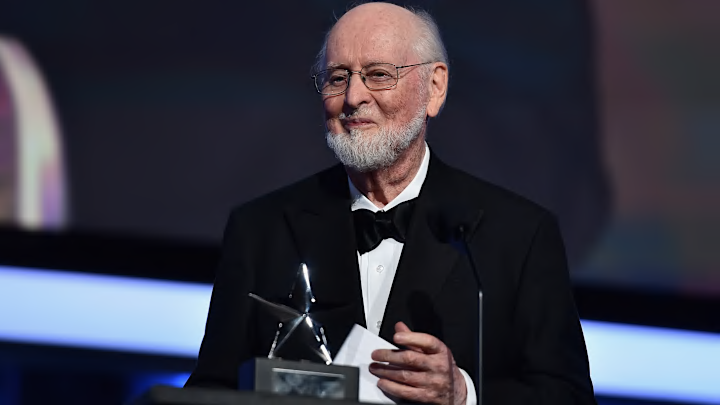November 1 saw the Disney+ release of Music by John Williams, a documentary that chronicles "maestro John Williams' own story" in just under two hours. As I have been playing music since the age of 3, John Williams has been a hero to me since before I saw Star Wars. This feature taught me things I had never known and reached me on an emotional level in the same way that his scores do.
Here are the 5 best moments of Music by John Williams.
1. The original "Binary Sunset"
"Every once in a while there'd be a cue, and I'd say, 'That's not what I had in mind here,'" says George Lucas during an extended section on the first Star Wars film. A few seconds later, we see Tatooine's twin suns and the words "unused cue" on the screen. The music is high and frenetic, with a touch of uncertainty and a brass menace in the background as Luke Skywalker contemplates the path ahead. It musically resembles an earlier John Williams work, Close Encounters of the Third Kind and similarly reflects the power of the unknown.
The music that replaced this hum of anticipation is full of purpose and longing, and it becomes the victory march at the end of the film. It would be interesting to hear what the original music would have sounded like if used for that same purpose.
2. Prep for the Cantina Band
A lot of time is dedicated to Williams' background as a jazz musician and composer. He was active in his high school band and orchestrated some of the music for the ensemble.
This jazz background gave the Mos Eisley cantina such a distinctive musical backdrop. While Figrin Dan and the Modal Nodes weren't playing what they usually sell to Earth-based musicians, their stylings are some of the most relatable pieces of music audiences heard in that first movie.
3. The resignation
I grew up in Boston and remember taking a school bus into the city to see John Williams conduct his own music at the head of the Boston Pops. One of my favorite CDs was a compilation of movie music by John Williams, played by that orchestra under his baton.
Imagine my surprise when the documentary explored how deeply musicians in my hometown hated his work. "I think Boston musicians were critical of entertainment music or wary of it," Thomas Newman, an American film composer, relates. John describes the older musicians as "very disapproving," In 1984, musicians hissed at their conductor, and after four years of hostility, John Williams resigned. He would later return to the job and continued conducting until 1993.
These days, films in concert are a popular feature among major orchestras, and there is great enthusiasm for film scores. The unprofessional conduct of the Pops members in 1984 is simply unimaginable.
4. "Yoda's Theme"
The leitmotif for a Jedi Master introduced in Episode V: The Empire Strikes Back is one of the most understated pieces of music in the Williams repertoire. It requires no extraordinary skill or unusual instruments to play well, but it combines the gravity of Yoda's wisdom and his playful nature. Yoda is my favorite Jedi, and his music is part of that.
Close to the end of the documentary, John lists his favorite compositions. The ending of the cello concerto. The second movement of the violin concerto he wrote in memory of his late wife. He then describes Yoda's theme as "especially good," and "original...[and] very simple." It's a joyful thing to hear appreciation for the music that causes such thrills from the man who thought of it.
5. "What is that? What are you going to do?"
The film begins with the almost chthonic shark music of Jaws. Of course, we know what it portends because that music has scared the living daylights out of many of us over the years. However, Steven Spielberg recalls having no idea what role it would play in the movie that Williams was scoring.
Fans of film music can relate to that sense of wonder and anticipation. John was contracted to write a magical piece for a trailer, and the result is what we now know as "Hedwig's Theme" from Harry Potter and the Sorcerer's Stone. For the trailer, it was simply a mood instead of an iconic expression of a beloved character, and John Williams' ability to create a world out of something so simple is one of his greatest talents.
Music by John Williams can be found on Disney+.
